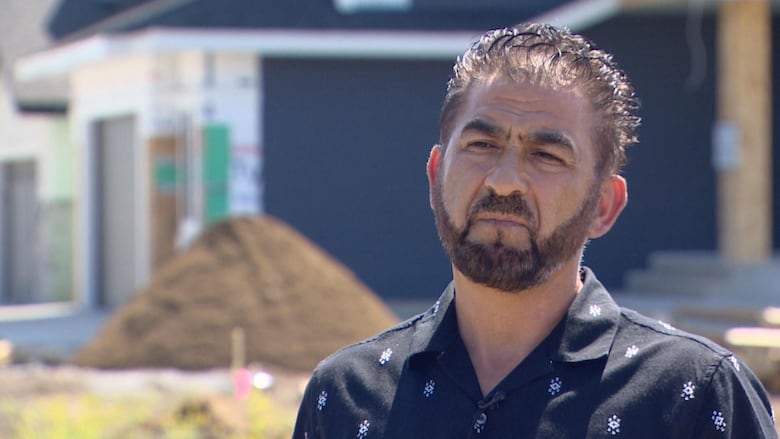Some Edmonton builders see up to 20% cost increases as tariff war continues
U.S. President Donald Trump signed executive order boosting tariffs to 35%

Construction experts say it's too soon to say how swiftly Edmonton's industry will be hit as U.S. President Donald Trump unveils a new set of tariffs — but some builders say they've had to deal with sharp increases of up to 20 per cent on supplies.
"Since the tariffs and the announcements came out, we have been seeing lots of uncertainty," Issam Saleh, owner of Edmonton-based Vivid Homes, told CBC on Friday.
"Our customers that we've been working with, they have been extremely cautious in terms of closing a deal."
Trump signed an executive order on Thursday boosting tariffs from 25 per cent to 35 per cent on Canadian goods that don't comply with the Canada-U.S.-Mexico Agreement (CUSMA).
"Our prices have escalated and increased, I would say, about 20 per cent," Saleh said, adding that sales have been impacted.
"And then every time we go back to the customers about these prices, it just sends another negative vibe for them to close the deal.
Scott Fash, CEO for Building Industry and Land Development Association (BILD) Alberta, said the situation is multifaceted and that costs may arise as a result of Canada's response to the U.S. imposing tariffs.
"It's not the U.S. tariffs that impact the cost of housing. It's the Canadian tariffs that we put on in response to the U.S. tariffs. So us putting tariffs on a whole bunch of the U.S. products that we purchased to then build a home," Fash said.
"That's where we're going to potentially see the impacts on housing costs, and in Canada and Alberta."
Fash said much of the impact is from things like washers, dryers, stoves, HVAC systems and plumbing.
Close to 70 per cent of the gypsum used to make drywall is also imported from the U.S.
Fash said the federal government will need to be mindful on how it carves out exemptions for construction input costs.
"Knowing we need to respond, but … selective in a way that's not going to hurt the person trying to buy a house."
For some like Charles St-Arnaud, chief economist at Alberta Central, the central banking facility and trade association for. Alberta's credit unions, the overarching impact may not be as bad as it seems.
"As more and more businesses do the paperwork and the heavy lifting to get their CUSMA compliance certificate .... the share of our exports that are submitted to tariffs will continue to to move lower," St-Arnaud said.
However, St-Arnaud said tariffs still don't bode well for the construction industry.
"The impact will be mainly on increased construction costs, in an area where already we're dealing with affordability issues, is not helping to provide a cheaper supply on the market."
Long-term impacts
Edmonton commercial contractor Jen Hancock with the Alberta Construction Association is optimistic about the long-term impacts of the tariffs.
"With all the uncertainty, you see people hedging bets, raising prices, just little bits and pieces here and there, but that starts to layer on top of each other, projects become more expensive," Hancock told CBC.
"Companies aren't going to lower their price, if they've been hedging their bets around tariffs, if they can get that money. So the uncertainty that's being created in the market right now is actually probably permanently raising construction costs, which isn't great for owners and it's not great for companies."
With files from Andrea Huncar and Eve Côté


